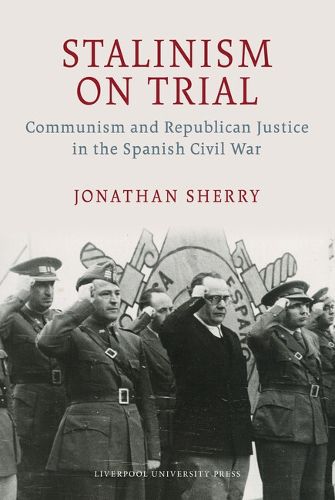Readings Newsletter
Become a Readings Member to make your shopping experience even easier.
Sign in or sign up for free!
You’re not far away from qualifying for FREE standard shipping within Australia
You’ve qualified for FREE standard shipping within Australia
The cart is loading…






Stalinism on Trial analyzes judicial politics in Republican Spain during the Spanish Civil War of 19361939. It examines the relationship between the Spanish Republican government and its Soviet ally by way of a micro-history of the prosecution and trial of a communist (but anti-Stalinist) party, the Partido Obrero de Unificacion Marxista (POUM; Workers Party of Marxist Unification). The state prosecuted the POUM for espionage, treason, and rebellion against the government, but convicted its leaders only of the third charge. The prosecution took place amidst repressions and show trials in the USSR. Jonathan Sherry challenges interpretations of Soviet involvement in Spain that attribute political repression to vacuous notions of Stalinism and the reputed all-powerful hand of Moscow. Interrogating the notion of the Moscow Trial in Spain he evaluates the political influences that shaped the prosecution using materials from various archives, especially the Fundacion Juan Negrin. The Republics prosecution of the POUM leadership should be understood within the context of a broader effort to reconstruct the Republics penal institutions. Throughout the prosecution, Negrins judiciary remained dedicated to a liberal conception of justice that attempted to preserve the individual rights of the defendants. In the struggle for control between Spanish Republican officials and Soviet-affiliated advisors, the former prevailed over the latter, with Negrin acting as a skilled mediator. The trial represented the finale of the contentious debate about what form justice should take in a nation in the throes of revolution and civil war. The judiciary rejected the contemporaneous Moscow trials in both form and content, and sought to reinforce the legitimacy of the Republican government internally and internationally. Rather than providing Soviet representatives an opportunity to extend their campaign against Trotskyism to Republican Spain, the prosecution constituted a sharp rebuke of Soviet politics. Published in association with the Canada Blanch Centre for Contemporary Spanish Studies
$9.00 standard shipping within Australia
FREE standard shipping within Australia for orders over $100.00
Express & International shipping calculated at checkout
Stalinism on Trial analyzes judicial politics in Republican Spain during the Spanish Civil War of 19361939. It examines the relationship between the Spanish Republican government and its Soviet ally by way of a micro-history of the prosecution and trial of a communist (but anti-Stalinist) party, the Partido Obrero de Unificacion Marxista (POUM; Workers Party of Marxist Unification). The state prosecuted the POUM for espionage, treason, and rebellion against the government, but convicted its leaders only of the third charge. The prosecution took place amidst repressions and show trials in the USSR. Jonathan Sherry challenges interpretations of Soviet involvement in Spain that attribute political repression to vacuous notions of Stalinism and the reputed all-powerful hand of Moscow. Interrogating the notion of the Moscow Trial in Spain he evaluates the political influences that shaped the prosecution using materials from various archives, especially the Fundacion Juan Negrin. The Republics prosecution of the POUM leadership should be understood within the context of a broader effort to reconstruct the Republics penal institutions. Throughout the prosecution, Negrins judiciary remained dedicated to a liberal conception of justice that attempted to preserve the individual rights of the defendants. In the struggle for control between Spanish Republican officials and Soviet-affiliated advisors, the former prevailed over the latter, with Negrin acting as a skilled mediator. The trial represented the finale of the contentious debate about what form justice should take in a nation in the throes of revolution and civil war. The judiciary rejected the contemporaneous Moscow trials in both form and content, and sought to reinforce the legitimacy of the Republican government internally and internationally. Rather than providing Soviet representatives an opportunity to extend their campaign against Trotskyism to Republican Spain, the prosecution constituted a sharp rebuke of Soviet politics. Published in association with the Canada Blanch Centre for Contemporary Spanish Studies